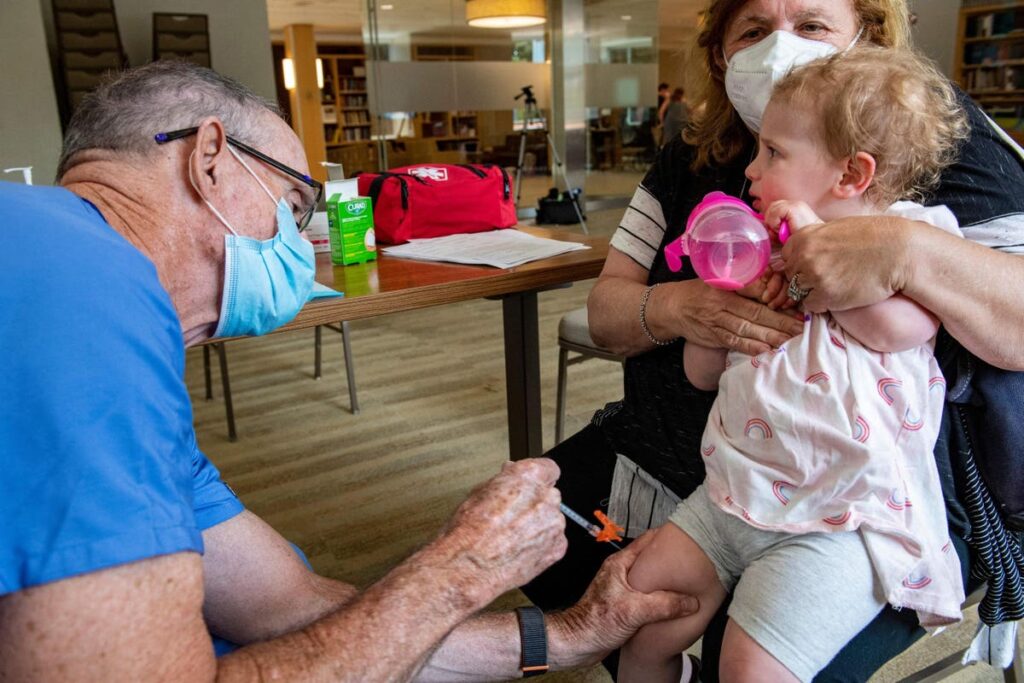A 22 month old baby receives a Moderna Covid-19 vaccination. (Photo by Joseph Prezioso / AFP) (Photo … [+]
Despite the known risks of Covid-19 in young people, information about the effectiveness of the existing vaccines in children remains limited. On Thursday, the CDC published a report that substantially improves our understanding of Covid-19 vaccine effectiveness in this group of people. Bottom line? Children who have been fully vaccinated are less likely to make Covid-19-associated emergency department or urgent care visits.
Since March 2020, over 1.1 million people in the United States have died of Covid-19. Typically, the disease is less severe in children and adolescents than in other age groups. However, it still can lead to hospitalizations and death in young people. Indeed, researchers previously reported that, between August 1, 2021 and July 31, 2022, Covid-19 was one of the leading causes of death among people under the age of 20 in the United States, accounting for 2% of all deaths in this age group.
To help protect children from the risks of Covid-19, the Food and Drug Administration previously granted emergency use authorization to the monovalent Covid-19 mRNA vaccines developed by Moderna and Pfizer-BioNTech in children over the age of 6 months. Largely, this approval was based on relatively small trials in which researchers primarily examined the safety of the vaccines and the ability of the vaccines to elicit antibody production in the children. The current study included many more participants and researchers looked primarily at vaccine effectiveness.
To assess vaccine effectiveness, researchers evaluated the vaccination status of children who visited participating emergency departments or urgent care centers with Covid-19-like illnesses. SARS-CoV-2 nucleic acid testing information for the children also was recorded. The researchers then asked a relatively simple question. Were fully vaccinated children who made ED or UC visits less likely than their unvaccinated counterparts to receive a positive SARS-CoV-2 test result? In other words, do the Moderna and Pfizer-BioNTech vaccines decrease the likelihood of severe disease in children? The short answer? Yes.
Let’s look at the data.
Over 90,000 children who made visits to emergency departments or urgent care centers were included in the Moderna part of the study. About 81,000 children were included in the Pfizer-BioNTech part of the study. Among unvaccinated children, 5.5% of the children in the Moderna part of the study and 5.9% of the children in the Pfizer-BioNTech part of the study tested positive for the virus. Children who were partially vaccinated (a single dose of either vaccine) showed only a slightly lower positivity rate. However, among children who received the full recommended regimen of either vaccine, that number dropped to less than 3%. In fact, only 1.1% of children who received three doses of the Pfizer-BioNTech vaccine less than two months before their visit to the ED or UC had a positive SARS-CoV-2 result.
The data also indicate that children who received a bivalent booster after receiving the recommended monovalent vaccines exhibited much greater protection. However, the number of children in this category was low. Additional data indicate that immunity in children, as in adults, probably decreases over time. Less of a protective effect was seen in children who had received their vaccine more than 2 months before visiting the emergency department or urgent care center. Finally, it’s worth noting that children who received one dose of the Moderna vaccine and one dose of the Pfizer-BioNTech vaccine were excluded from the analysis. Only children who received a complete vaccine regimen from a single manufacturer were included.
This report provides strong evidence that the available mRNA vaccines reduce the likelihood that SARS-CoV-2 infections in children will lead to severe disease. The data also demonstrate the value of the full vaccination regimen. But, data collected by the CDC indicate that vaccination rates among children are woefully low throughout the country. The available vaccines remain our best means of protection against a virus that has not gone away. But those vaccines are only useful if they are used.


